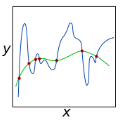Adversarial training and data augmentation with noise are widely adopted techniques to enhance the performance of neural networks. This paper investigates adversarial training and data augmentation with noise in the context of regularized regression in a reproducing kernel Hilbert space (RKHS). We establish the limiting formula for these techniques as the attack and noise size, as well as the regularization parameter, tend to zero. Based on this limiting formula, we analyze specific scenarios and demonstrate that, without appropriate regularization, these two methods may have larger generalization error and Lipschitz constant than standard kernel regression. However, by selecting the appropriate regularization parameter, these two methods can outperform standard kernel regression and achieve smaller generalization error and Lipschitz constant. These findings support the empirical observations that adversarial training can lead to overfitting, and appropriate regularization methods, such as early stopping, can alleviate this issue.
翻译:对抗训练和含噪数据增强是提高神经网络性能的常用方法。本文在再生核希尔伯特空间逐步回归的背景下研究对抗训练和含噪数据增强。我们建立了攻击和噪音大小以及正则化参数趋近于0时这两种方法的极限公式。基于这个极限公式,我们分析了具体情境,并证明了如果没有适当的正则化,这两种方法可能比标准核回归存在更大的广义误差和Lipschitz常数。然而,通过选择适当的正则化参数,这两种方法可以超越标准核回归,实现更小的广义误差和Lipschitz常数。这些发现支持了对抗训练可能导致过拟合的经验证据,并证明了适当的正则化方法(如早期停止)可以缓解这个问题。



